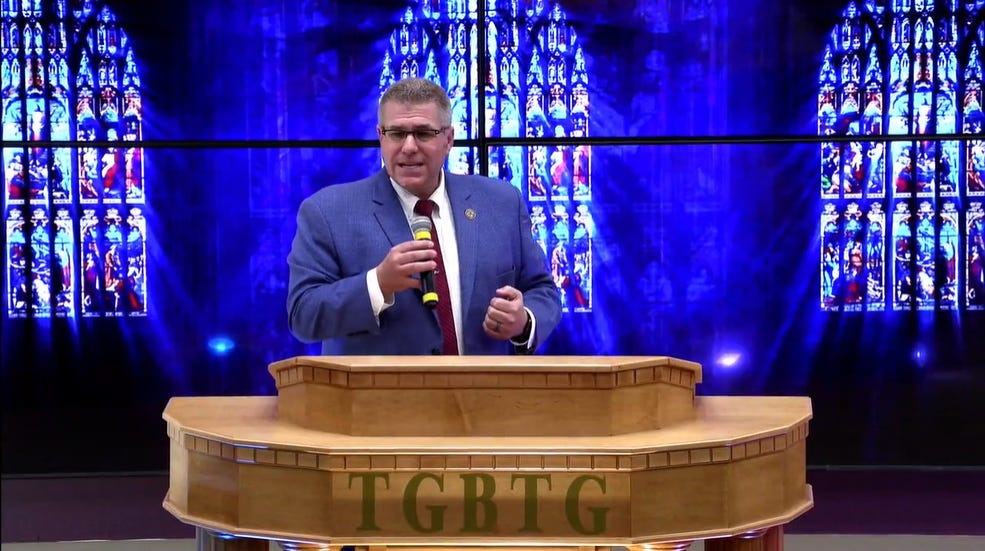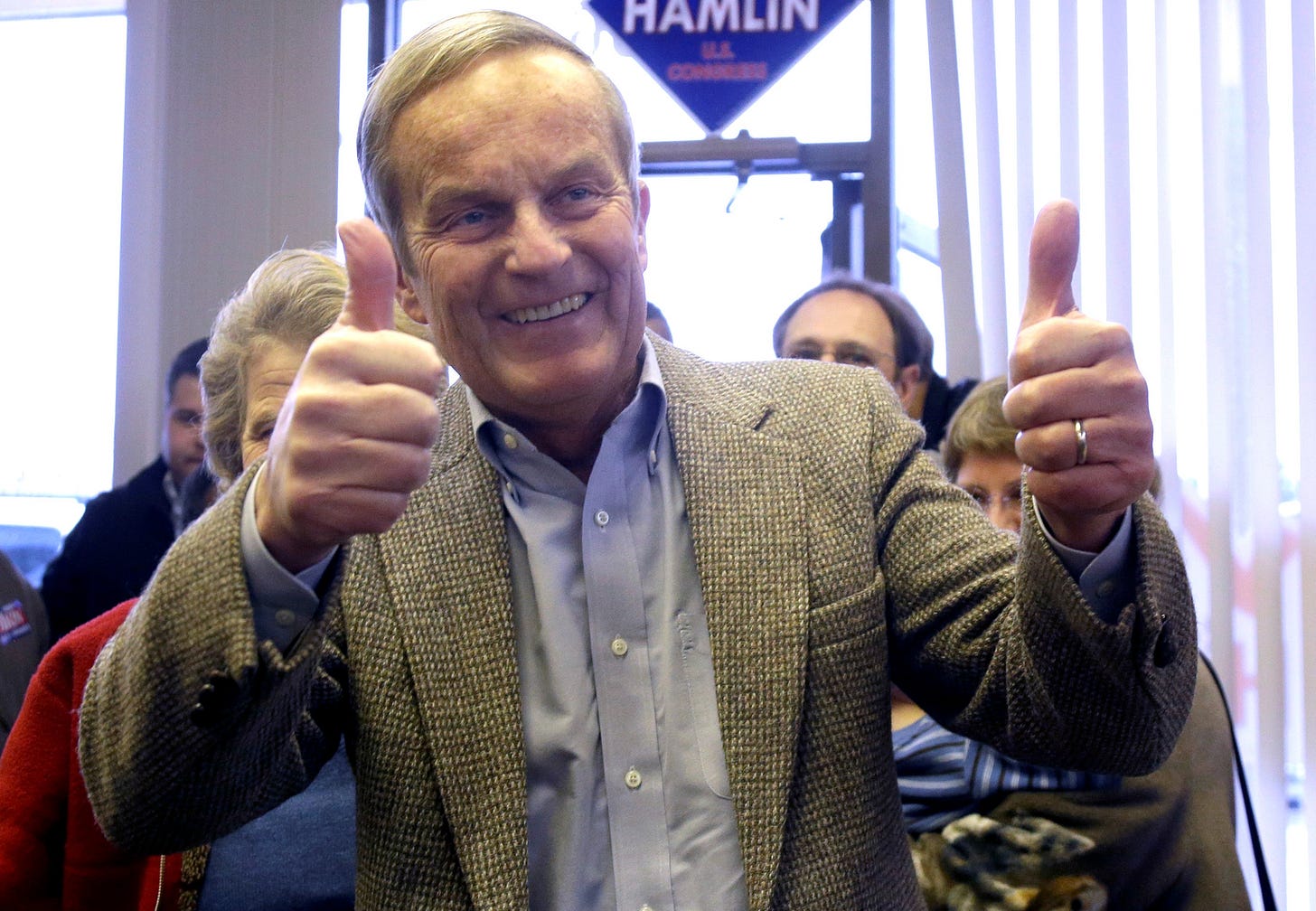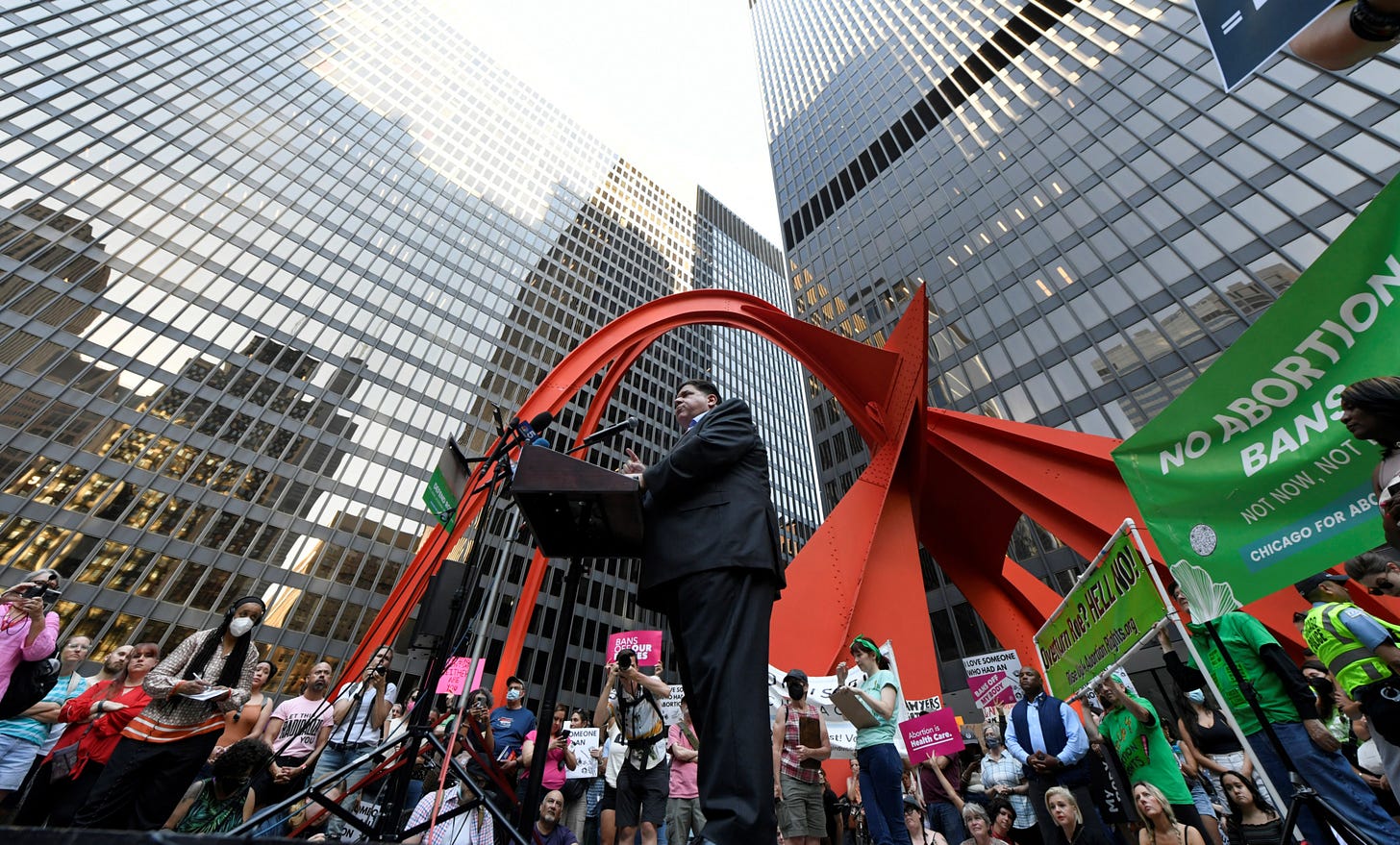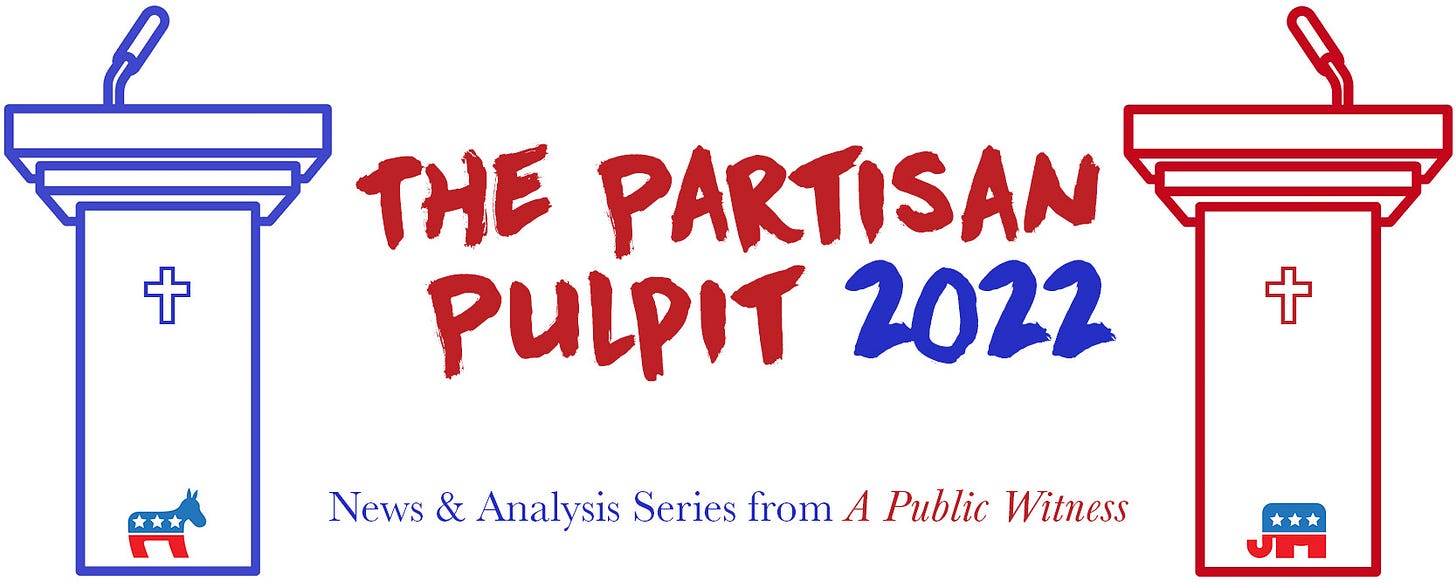Democrats Boosting Christian Nationalism
On Saturday (June 25), former President Donald Trump held a rally in Mendon, Illinois, and announced his endorsement for the Land of Lincoln’s next governor. Polling indicates that his choice in the crowded field, State Sen. Darren Bailey, didn’t need the support to win today’s primary, but it will likely help seal the victory. Over the past month, Bailey soared in polls past his main rival, Aurora Mayor Richard Irvin. And what propelled Bailey’s rise? A massive ad campaign of nearly $35 million to convince Republicans that Bailey is the most conservative candidate.
The ads were paid for by Democrats.
The premise of the ads isn’t wrong. Bailey is much more conservative than Irvin, which is why incumbent Democratic Gov. J.B. Pritzker and the Democratic Governors Association poured tens of millions into the primary in hopes of facing Bailey. Reid Epstein of the New York Times called it “an unprecedented intervention” as “no candidate for any office is believed to have ever spent more to meddle in another party’s primary.” And, Epstein added, it put the race “on track to become the most expensive campaign for a nonpresidential office in American history.”
The theory driving the Democratic spending spree is that Bailey will be easier to defeat in the general election. The ads worked in boosting Bailey’s polling (and thus in gaining Trump’s endorsement as the former president looks to increase his win ratio in endorsement picks). And the gamble might pay off in November if Pritzker coasts to an easy reelection. But the move might also create significant problems.
After all, Bailey is a radical candidate. He fought COVID-19 health measures and refuses to acknowledge that President Joe Biden won the 2020 presidential election. And he espouses Christian Nationalism on the campaign trail, even featuring the passage from Ephesians 6 about “the armor of God” on the door of his campaign bus.
This means that the biggest booster of a Christian Nationalism campaign in Illinois is none other than the Democratic Party. They’ve spent more than twice as much for Bailey as Bailey’s own campaign. And while this is the most expensive case, it’s a trend happening elsewhere — like in Pennsylvania as the state’s Democratic gubernatorial candidate boosted the rise of Doug Mastriano, another candidate espousing radical Christian Nationalism.

In a tough election cycle, Democrats are playing with fire in seeking softer general election candidates. Even if they are successful in the short run, this risky kind of politics could still end up burning us all. In this issue of A Public Witness, we introduce the likely Republican gubernatorial nominee in Illinois. Then we revisit previous examples of interparty primary meddling before warning about the potential dangers of fueling Christian Nationalism for partisan gain.
Man on a Mission
Darren Bailey quickly made a name for himself by pushing Christian Nationalism legislation after his election to the state House of Representatives in 2018. The first bill he sponsored was to encourage public schools to post “In God We Trust” in their buildings. His goal wasn’t patriotic but sectarian.
“I introduced this because I believe there is power in honoring the name of God,” Bailey explained at the time.
Bailey added that his bill would uphold what he saw as the nation’s “Christian heritage.” And he dismissed concerns about separation of church and state, insisting people were misapplying it. After debate about another bill, he criticized a fellow lawmaker for having “the gall to bring up separation of church and state.”
Before Trump backed him, Bailey gained the support of Illinois Family Action, a state affiliate of the American Family Association (a significant force within the Religious Right). For months before that, Bailey had continued his legislative push for Christian Nationalism ideas about a “Christian” nation on the gubernatorial campaign trail.
This included a number of partisan campaign rallies in churches — some during worship services. Like his appearance at the Refuge Temple Church of God in Marion on May 29. Even though 501(c)(3) nonprofits like houses of worship aren’t allowed to engage in partisan politicking, he mentioned his gubernatorial campaign from the pulpit and asked people to pray for him and the state and “work with me” to make “Illinois the beacon on the hill that I know God intends for it.”
Bailey even campaigned during a church service on the Sunday before Christmas. After being introduced by the pastor at the Christian Church of Witt as a gubernatorial candidate, Bailey wished everyone “merry Christmas” and then talked about the election and key campaign issues. He called his campaign “our mission field moment” for him and his wife. He then led the congregation in prayer before the pastor returned to also pray for Bailey and the campaign.

At times, Bailey even pushed church attendance as a campaign event. He encouraged people to join him Sunday morning on May 22 for a “church service with candidate for governor Darren Bailey” at Harvest Bible Chapel in Chicago.
Calvary Chapel in Rockford held a “meet & greet with Darren Bailey” worship service on Jan. 29. After prayers and a couple worship songs, the pastor preached about why churches should be engaged in politics. He railed against critical race theory and mask and vaccine mandates before adding, “As you guys can see right now, this government — whether in the state of Illinois or in our country — is the most anti-Christ, anti-God thing out there.” Refusing to challenge such a government, he added, is “not Christian.” Thus, he urged his congregation to pray for God to “raise up godly men.”
Bailey quickly echoed the religious-infused partisan rhetoric. In his campaign-focused remarks, he attacked Democrats and explained why people should vote for him. Bailey insisted his campaign was “the story of we the people getting engaged, taking these God-given responsibilities to save a God-given republic so we can enjoy God-given freedoms.” He also bragged about his earlier stint on a local public school board during which he asked potential employees during job interviews where they go to church because he wanted godly teachers to impact children.
“I believe what we do in 2022 will resonate into the election of 2024, and I think this country’s going to become the country that God intended it to be again,” he added.
Signal Boosting
What’s unfolding in Illinois is hardly new. The political logic is understandable. In helping more extreme candidates win Republican primaries, Democrats increase their chances of victory in general elections when candidates typically seek to appeal to more moderate and independent voters. Any rational party focused on building power through democratic processes does basically everything it can to win an election (as opposed to those who might choose extralegal means of overturning the will of voters in order to retain office).
Back in 2010, Sen. Harry Reid’s career appeared to be near its end. As the Senate Majority Leader, his association with the national Democratic Party during a time of economic upheaval and high unemployment left his approval ratings hovering in the mid-30s. He prepared to spend tens of millions of dollars to “reintroduce himself” to Nevada voters.
The other part of Reid’s reelection plan was to “vaporize” his strongest opponents, relentlessly attacking them with negative ads during the primary. The strategy worked. Sue Lowden, the early frontrunner for the GOP nomination, lost the primary contest to the more extreme Sharron Angle, who was endorsed by the Tea Party and campaigned erratically. Reid squeaked out a victory, defeating Angle by a margin of less than 6%.
Perhaps learning from Reid, vulnerable Missouri Democratic Sen. Claire McCaskill deployed the strategy in 2012 but added a twist. Rather than preemptively defining her feared GOP opponent, McCaskill spent millions of dollars in the Republican primary attacking then-U.S. Rep. Todd Akin, a more conservative but lesser-known candidate.
“There were three viable candidates and Todd Akin was kind of the weirdest one,” McCaskill told NPR. “I knew he might say some weird things if he were nominated. And he had less money, so we took a poll and figured out what Republican voters would really like about him.”
In painting Akin as “too conservative” in her ads, McCaskill deftly bolstered his appeal among the Republican base and helped him win the nominating contest. Of course, Akin infamously proceeded to defend his stance on abortion by talking about cases of “legitimate rape,” ignored calls by GOP leaders to drop out of the race, and lost to McCaskill by more than 15%. (But six years later she lost to the guy who gave a fist pump to the crowd on Jan. 6, 2021, that stormed the U.S. Capitol while carrying Christian flags and Jesus signs.)

While other examples could be noted, let’s fast forward to this election cycle. Doug Mastriano, a Pennsylvania state senator who was subpoenaed about his activities related to the insurrection on Jan. 6, 2021, ran in a crowded GOP primary for the nomination to be the Keystone State’s next governor. The outspoken candidate who espouses Christian Nationalism proved victorious in part for reasons similar to Bailey in Illinois.
Like with Bailey, Mastriano received a late endorsement from Trump on the weekend before the primary. But that only came after Mastriano already gained a seemingly-insurmountable lead in the polls. Before that, the campaign of Josh Shapiro (the incumbent state attorney general running unopposed in the Democratic primary) aired a TV ad ostensibly attacking Mastriano for being “one of Donald Trump’s biggest supporters” and cautioning that “if Mastriano wins it’s a win for what Donald Trump stands for.” Clearly designed to both drum up Trump’s base in the primary and alienate Mastriano from swing voters in the general election, the ad proved successful at the former but the verdict on the latter won’t be in until November.
Bailey and Mastriano are not outliers. In an election cycle expected to favor Republicans due to a tough economic environment and historic midterm trends favoring the party not in the White House, the Democratic Party and associated groups are playing favorites in Republican primary races across the country. It is a strategy that has proved successful in the past, but it also comes with great risk.
Long Term Consequences?
The problem with political strategies focused on winning the next election is that such an approach can be shortsighted. What if there’s more at stake than the outcome of a particular race? After all, upsets do happen. Fringe candidates sometimes win. Many liberals didn’t think Trump could win in 2016 and were eager to face him. Then he won. His victory should make us all more mindful of the risk.
If democracy itself is on the ballot, then the calculus becomes more complicated. And that’s where the Democratic Party’s strategy has already garnered some criticism. Republican fringe candidates may drive moderate voters into the arms of Democrats but that may not be the only effect.
“What tamps down the enthusiasm of the Republican base is candidates who are more wishy-washy on the red-meat cultural issues that Trump and his ilk obsess over and exploit,” Alex Shepherd explained for The New Republic. “Democrats are hoping that they can motivate moderate voters to turn out to block extremist Republicans but may very well, in turn, be inspiring Trump-loving voters who don’t often turn out to the polls to come out and vote for the non-RINO who managed to defeat a GOP moderate.”
If the more extreme candidates manage to win in November, then Democrats will have inadvertently undermined the very democracy they accuse Republicans of attacking. As the Democratic strategist Howard Wolfson told the Washington Post, “I think it’s very dangerous and potentially very risky to elevate people who are hostile to democracy. Either this is a crisis moment or it isn’t. And if it is — which it is — you don’t play cute in a crisis.” Given Mastriano’s presence in D.C. on Jan. 6 and his efforts to overturn the 2020 election results in Pennsylvania, if he wins in November the outcome will be much more dangerous than if a more moderate Republican had gained the nomination.
To those concerns we add another. Many of the more extreme candidates benefitting from the Democrats’ not-so-secret funding strategy are advocates for Christian Nationalism. As they win primaries, their perspectives are normalized within both the GOP and the American political landscape. The electoral process legitimizes views previously regarded as fringe, rendering them more socially acceptable.
The influence of Christian Nationalism can grow with the nominations of candidates like Bailey and Mastriano even if they lose in November. As Thomas Devore, an ally of Bailey running in the GOP primary for Illinois attorney general, explained, “Whether or not Darren and I win the general election, if we can at least get control within our own party, I think long term we have an opportunity to be successful.”
Helping Devore, Bailey, and Mastriano in that effort is the Democratic Party. We fear it will only further poison our politics and our churches. After all, with Bailey and Mastriano already campaigning in churches in their primaries, we can expect more such Sunday politicking with them as the nominees. Thanks in part to Democratic money.

We asked Mike McCurry about this phenomenon. A longtime Democratic strategist, he served as White House press secretary for President Bill Clinton after also working for Democratic politicians like Daniel Patrick Moynihan, John Glenn, and Lloyd Bentsen as well as the Democratic National Committee. After his time in the White House, he went to seminary and then taught at Wesley Theological Seminary in Washington, D.C.
“The strategy of promoting extreme opponents who might be easier to beat in a general election has one dangerous downside,” McCurry told us. “It further normalizes polarization and weakens the center. And what’s that line from Yeats? ‘Things fall apart/The center cannot hold/Mere anarchy is loosed upon the world.’”
“My old boss, Daniel Patrick Moynihan, often said that the test of American democracy would be if the center can hold. Things are not looking so good on that front,” McCurry added.
Just as the anti-abortion movement spent decades working to overturn Roe v. Wade, proponents of Christian Nationalism are playing the long game. Through Supreme Court victories and a rewriting of American history, they seek credibility for their anti-democratic, ahistorical claims. Winning elections, whether in the primary or the general, further validates and amplifies their perspectives. They may not put their hands on Bibles next January to take oaths of office, but winning primary fights helps the next round of such candidates accomplish exactly that.
That’s the moral conundrum Democrats face. Seeking to retain or expand their political power in Congress and statehouses, they are maximizing their likelihood of success in 2022. They are not responsible for conspiracy theories, extreme ideas, and Christian Nationalism animating major portions of today’s Republican Party. However, they are aiding and abetting some of the GOP’s worst offenders. Only time will tell if they were shrewd political operators or accomplices to anti-democratic crimes forcing the center to fall apart.
As a public witness,
Brian Kaylor & Beau Underwood
Read earlier reports in “The Partisan Pulpit” series from A Public Witness:





Even crazy people get to particiapte in American democracy, does not make them less crazy just part of American tradition